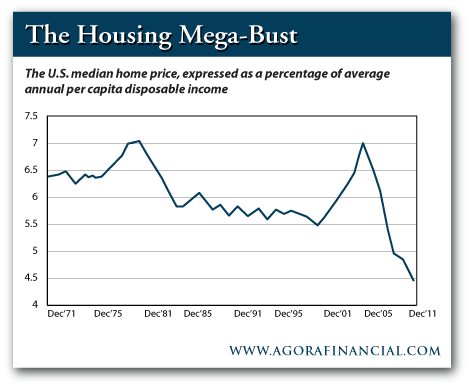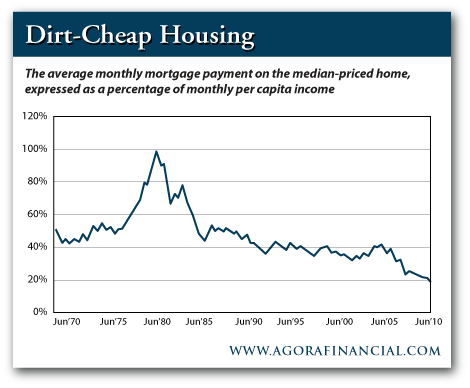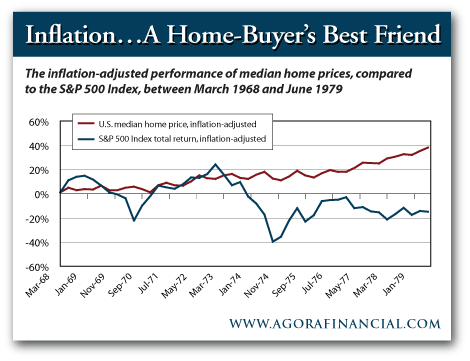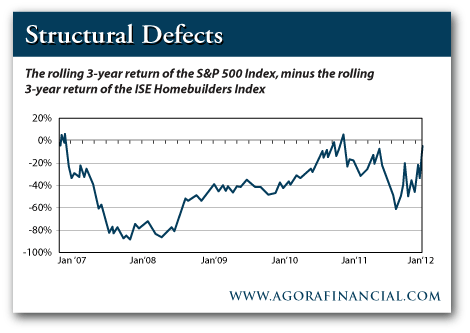Outlook for the Busted U.S. Housing Market, Cheapest Prices in 40 Years
Housing-Market / US Housing Apr 10, 2012 - 06:11 AM GMTBy: LewRockwell
 Addison Wiggin. writes: A little more than a year ago, a very successful professional investor declared, “If you don’t own a home, buy one. If you own one home, buy another one, and if you own two homes, buy a third and lend your relatives the money to buy a home.”
Addison Wiggin. writes: A little more than a year ago, a very successful professional investor declared, “If you don’t own a home, buy one. If you own one home, buy another one, and if you own two homes, buy a third and lend your relatives the money to buy a home.”
Since that declaration, house prices have continued drifting lower in most parts of the country. The Case-Shiller index of national home prices is down about 4% year over year. Even so, we’re betting this professional investor was merely early...not wrong. US housing isn’t just cheap; it is the cheapest it has been in more than 40 years. And when one considers the possibility that inflation may rear its head soon, housing looks even cheaper still.
If you think we’re crazy, you’re not alone. The housing market is a complete bust right now. The following chart shows the median home price in terms of per capita disposable income. Based on this calculation, home prices are lower than they have been in 40 years!

And it isn’t just that home prices have fallen a long way. For most home buyers, the price of the home is only one part of the true cost of a home. Mortgage rates matter as much, or more, than the purchase price itself. In other words, buying a house is not just a bet on real estate; it is also a bet against interest rates. For the typical buyer of a home who takes out a 30-year mortgage, an increase in interest rates is just like an increase in the price of a home.
Today, because home prices and interest rates are both at extremely low levels, the cost of buying a home with a 30-year mortgage is at an all-time low. To illustrate this stunning fact, the chart below shows the average monthly mortgage payment on the median-priced home, expressed as a percentage of per capita disposable income.

If you can get a mortgage, you are basically taking a reverse bet on the bond market. You could be a long-term borrower at fixed rates, instead of a long-term lender. Right now, you can borrow for 30 years at around 3.3%. After the mortgage tax deduction, for some people the net effective interest rate is nearer to 2%! That’s going to prove an awesome deal if we see inflation again.
But here’s the factor that clinches the case for investing in residential real estate: the long-term supply and demand for housing. Let’s start with supply.
Consider how long it will take to bring new supply to the market. As investors, we want new supply to come slowly.
The number of housing starts is currently lower than at any time in at least the past 50 years. Moreover, new construction is only about half the long-term average. Again, good news for investors in housing, since this means that new supply is growing very slowly.
Meanwhile, housing demand – based simply on demographic trends – should rise inexorably for years to come. Take the growth in households – driven by population growth – and apply a home ownership rate. Demographically, the US is still a growing country. By 2030, there will be 370 million Americans. Even using the long-term average home ownership rate means we’ll need 1.1-1.2 million new single-family homes per year.
In other words, busted markets don’t last forever. The cure for low prices, as the old saw goes, is low prices. Furthermore, a bet on the housing market is not merely a bet on real estate; it is also a bet that inflation will rise.
The US economy may be idling in neutral for the moment, but inflation is revving its engines. How should you prepare?
“Buy gold” is the time-honored answer, and we don’t quarrel with it. But an alternative answer, especially this time around, might be: “Buy a house.”
That’s the advice offered by a growing – but still small – number of very successful investors. John Paulson is one of them. He is the guy who said about a year ago, “If you don’t own a home, buy one. If you own one home, buy another one, and if you own two homes, buy a third and lend your relatives the money to buy a home.”
He was early...and his hedge fund performed very poorly last year, mostly because he was too early betting big on a rebound in the US economy. Double wrong! But we still think Paulson’s call on housing may be close to the mark.
Despite his dismal performance in 2011, Paulson is the guy who turned one of the greatest trades of all time. Betting against the housing market, he netted a cool billion dollars for himself in 2007. One fund he managed rose 590% that year. Today, he is one of the richest men in America...still.
His advice today is very different than it was in 2007. “Buy a house,” he says.
And he has put money where his mouth is...He already owns posh digs in Manhattan on 86th Street, plus a Southampton house he nabbed in 2008. In 2010, he snapped up an 8-acre ranch in Aspen for a cool $24.5 million, before buying a Fifth Avenue condo at a 23% discount to the asking price. (This 26th-floor pied-à-terre will be his “guest house.”)
Let’s flash back in time for a second...
Another successful investor gave similar advice in 1971 – the dawn of one of America’s biggest housing bull markets. The investor was Adam Smith (George Goodman) on The Dick Cavett Show. Here is a snippet from that conversation:
Smith: The best investment you can make is a house. That one is easy.
Cavett: A house? We were talking about the stock market. Investments...
Smith: You asked me the best investment. There are always individual stocks that will go up more, but you don’t want to give tips on a television show. For most people, the best investment is a house.
Cavett: I already own a house. Now what?
Smith: Buy another one.
How good was that advice?
Houses, as an investment, trounced stocks during the inflationary 1970s. The chart below tells the tale.

In the 1970s, US stocks returned about 5% annually – failing to keep pace with inflation. Still, it was an up-and-down ride. In 1974, the stock market fell 49%. But here are the average selling prices for existing homes in the 1970s, as inflation heated up:
1972 – $30,000
1973 – $32,900
1974 – $35,800
1975 – $39,000
1976 – $42,200
1977 – $47,900
1978 – $55,500
1979 – $64,200
That was a pretty impressive run-up in home prices. Today, I think we could be on the threshold of another once-in-a-generation buying opportunity in the housing market.
The homebuilding stocks seem to agree. Many of them have doubled during the last five months from their very depressed levels. Although the ISE Homebuilders Index is still down about 80% from its 2006 peak, it has been gaining steady ground relative to the rest of the stock market.
The chart below shows the rolling three-year price performance of the S&P 500 index, minus the rolling three-year price performance of the ISE Index. As you can see, the ISE has been lagging far behind the S&P 500 for most of the last five years. But during the last few months, this index has been closing the gap...and looks like it is about to begin a period of outperformance relative to the rest of the stock market.

So we like select homebuilding stocks, but we don’t love them. Unlike the housing market itself, homebuilding stocks have priced in quite a bit of good news already. Not surprisingly, therefore, the insiders at these companies have been doing a lot more selling of their own shares than buying. (Pulte is one conspicuous exception.)
We also like housing-related stocks. As Chris Mayer, our colleague over at Capital & Crisis, observes, “Companies such as Lowe’s (LOW) and Home Depot (HD) would benefit from a recovering housing market...as would the makers of flooring, Mohawk Industries (MHK), the makers of kitchen cabinets, Fortune Brands Home & Security (FBHS) and a whole bunch of stuff in between...In a robust housing market, good fortune would also smile on A.O. Smith (AOS), which makes water heaters for homes.”
But again, we don’t love these stocks. Not at their relatively rich valuations. Even so, we’ll be combing through this sector very carefully for promising investment ideas. In the meantime, for those with the means and the inclination, the best buy in the housing sector is an actual house!
This picture is unequivocal. US home prices are very, very cheap today. “Cheap” does not preclude “even cheaper,” of course. Home prices could certainly continue sliding. But even if that were to occur, mortgage rates might begin rising, which would cause the effective price of a home to increase.
Obviously, buying residential real estate at both a housing market low and an inflationary low would be the optimal entry point – in fact, it would be a screaming buy. And that’s exactly what today’s circumstances seem to be offering.
Perhaps that’s why a large number of very successful professional investors are licking their chops over opportunities in the US residential real estate market.
This out-of-favor asset class has attracted the attention of David Ackman, a hedge fund manager with a fondness for contrarian investments. He calls them SFHRPs, an acronym for “Single Family Home Rental Property.”
“The best investments we have made are the ones no one else would touch,” Ackman explains.
As housing prices have continued drifting even lower, Paulson and Ackman have picked up a little bit of company. The US housing market is becoming a central focus of several “deep value” investors. Over the past weeks, I’ve bumped into three very successful professional investors who were much more eager to talk about their real estate investments than about their stock market investments.
One gentleman in particular, who has made billions of dollars for his investors by buying deep value stocks, was much more eager to talk about his recent real estate investments than his recent stock market investments. He was talking glowingly – if not giddily – about the opportunities in real estate he was coming across.
“I’m not finding much to buy in the stock market at the moment,” he explained. “But real estate is a different story. I wish I had the capital to act on more of the ideas that are coming across my desk.”
We asked this investor if he was concerned about the risk of real estate prices falling even further.
“Nah,” he said as he waved the question aside, “I assume the housing market will remain soft for a while. But the kinds of deals we’re finding should work out well, even if the housing market keeps sliding for a bit. Besides, there’s one lesson I’ve learned repeatedly as a value investor in the stock market: You can have good news or cheap prices. You can’t have both.”
The US housing market has absolutely no good news...but plenty of cheap prices.
Addison Wiggin [send him mail] is the editorial director and publisher of The Daily Reckoning. He is the author, with Bill Bonner, of Financial Reckoning Day: Surviving The Soft Depression of The 21st Century and the upcoming Empire of Debt. His latest book is The Demise of the Dollar...and Why It's Great for Your Investments.
© 2012 Copyright The Daily Reckoning, Addison Wiggin - All Rights Reserved
Disclaimer: The above is a matter of opinion provided for general information purposes only and is not intended as investment advice. Information and analysis above are derived from sources and utilising methods believed to be reliable, but we cannot accept responsibility for any losses you may incur as a result of this analysis. Individuals should consult with their personal financial advisors.
© 2005-2022 http://www.MarketOracle.co.uk - The Market Oracle is a FREE Daily Financial Markets Analysis & Forecasting online publication.



